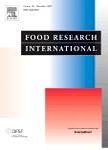版权所有:内蒙古大学图书馆 技术提供:维普资讯• 智图
内蒙古自治区呼和浩特市赛罕区大学西街235号 邮编: 010021

作者机构:Aarhus Univ Dept Food Sci Aarhus Denmark Aarhus Univ Dept Clin Med Aarhus Denmark Aarhus Univ Hosp Dept Infect Dis Aarhus Denmark
出 版 物:《FOOD RESEARCH INTERNATIONAL》 (Food Res. Int.)
年 卷 期:2025年第203卷
页 面:115804页
核心收录:
学科分类:0832[工学-食品科学与工程(可授工学、农学学位)] 08[工学]
基 金:Independent Research Found Denmark [0217-00218B] Graduate School of Technical Sciences (GSTS) Aarhus University, Denmark
主 题:Nanovesicle Metallothionein Zinc Intestine Tomato
摘 要:Extracellular vesicles (EVs) have the ability to regulate physiological and pathological processes across species and have been shown to be present in plants. Tomatoes are one of the most widespread vegetables on the market and exhibit a broad range of health-promoting effects, including antioxidant and anti-inflammatory properties. However, little is known about the bioactivity of tomato-derived EVs. Here, we isolated EVs from tomatoes and explored their gene regulatory potential using array-based transcriptomics. Interestingly, using a differentiated Caco-2 monolayer model, tomato-derived EVs were shown to upregulate the transportation of zinc, which may involve the down-regulation of metallothionein proteins (MTs). Differentiated Caco-2 cells internalized tomatoderived EVs. Post-EV treatment the relative expression levels of MT-related mRNAs within the cells decreased by approximately threefold, accompanied by an approximately twofold reduction in intracellular zinc concentration. Additionally, the amount of secreted zinc in the basolateral medium increased by approximately threefold. Moreover, tomato-derived EV regulation of MT gene expression occurred only in differentiated epithelial cells. This effect was observed in differentiated Caco-2 and HIEC-6 cells, whereas no impact was seen on the MT gene in undifferentiated cells. This mechanistic study uniquely demonstrates the bioactivity of tomato-derived EVs, and for the first time, reveals the ability of plant-derived EVs to modify zinc regulation across the intestinal epithelia. This further suggests the potential of plant-derived EVs as functional food supplements in the future.